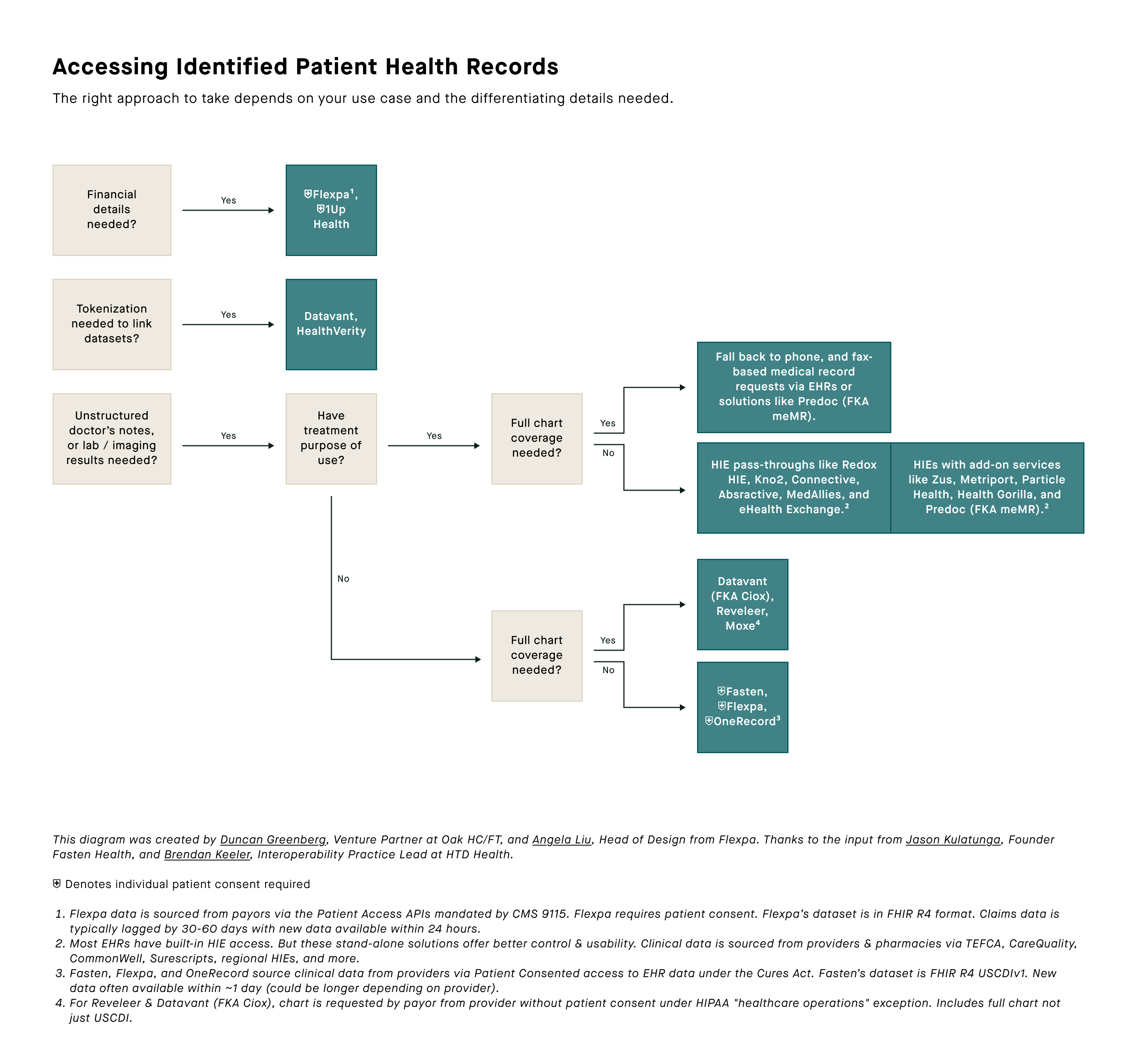How Flexpa Compares to Other Healthcare Data Access Methods
Understanding the differences between Flexpa's real-time FHIR API and traditional healthcare data access methods

Trusted by healthcare leaders, trusted by patients
Patient‑Consented Claims + Clinical Data
Healthcare data access has evolved significantly, with various methods emerging to help organizations retrieve patient information. There are numerous vendors with different subspecialties and the right vendor depends on your specific needs. We're here to help you navigate that landscape.
Flexpa retrieves patient‑consented, identified claims and clinical data from the following sources:
- TEFCA IAS - This is a national network of 41,000 unique connections that exposes USDCI data. Once a member connects, we can pull records from any facility that is on the network. This includes all Epic, Cerner, and Athena-powered facilities and includes detailed medical documents, lab results, observations, etc.
- EHR APIs - Every ONC certified EHR produces a patient access API, this network is addressable to every (compliant) facility in the country. For any facilities outside of TEFCA, we use these individual API connections.
- Payer APIs - Every payer that serves Medicare and Medicaid populations are required to produce a patient access API. This provides a timeline of the most critical patient medical history (diagnosis, procedures, medications, encounters, etc) and financial adjudication. We cover all compliant payers across all Medicare, Medicaid, and most commercial lines of business.
Here is a decision map to guide you towards the right vendors. Read on to delve into each vendor category in more depth.

Side-by-Side Comparison
Let's compare Flexpa with the other subspecialties of tokenized data, HIEs, and clearing houses across coverage, freshness, consent model, data format, and time to integrate—so you can choose the right path for claims and clinical use cases.
| Factor | Flexpa | Tokenized Data | HIEs | Clearing Houses |
|---|---|---|---|---|
| Data Freshness | Real-time | Static snapshots | Batch updates | Historical claims |
| Integration Time | Days | Weeks to months | Months to years | Months to years |
| Data Format | FHIR Standard | Varies by vendor | HL7 v2, CDA | X12 EDI |
| Patient Consent | Digital, real-time | Pre-aggregated | Opt-in/opt-out | Not required |
| Cost Structure | Annual License | Licensing + setup | Membership fees | Per transaction |
| Coverage | 350M+ lives | Varies by dataset | Regional coverage | Claims processing |
| Scalability | Auto-scaling API | Fixed datasets | Regional limits | Transaction-based |
Flexpa vs Tokenized Data
Tokenized data works well for population health research where individual patient identification isn't needed. Flexpa is better for applications requiring current, patient-specific claims and clinical data with proper consent.
Flexpa Advantages
- •Real-time data directly from payers and providers
- •Patient-authorized access with digital consent
- •Standardized FHIR format (claims and clinical)
- •No data licensing or storage requirements
Tokenized Data Limitations
- •Static datasets that become outdated quickly
- •No individual patient consent mechanism
- •Proprietary formats requiring custom integration
- •High upfront licensing costs
Flexpa vs Health Information Exchanges (HIEs)
HIEs are best for provider-to-provider clinical data sharing within a region. Flexpa is better for applications needing national coverage and comprehensive claims + clinical data.
Flexpa Advantages
- •National coverage across major payers and providers
- •Modern FHIR API with developer-friendly tools
- •Rapid integration in days, not months
- •Includes payment data alongside clinical data
- •Provides longitudinal view across all healthcare institutions
HIE Limitations
- •Regional coverage with gaps between systems
- •Legacy HL7 v2 and CDA formats
- •Complex membership and governance requirements
- •Limited to clinical data, no claims information
- •Requires treatment purpose of use in order to access
Flexpa vs Clearing Houses
Clearing houses are essential for claims processing and billing workflows. Flexpa is better for applications needing patient-authorized access to comprehensive health records.
Flexpa Advantages
- •FHIR-formatted data ready for modern applications
- •Real-time access to current patient data
- •Patient-authorized access model
- •Comprehensive claims + clinical data beyond just claims processing
Clearing House Limitations
- •X12 EDI format requires specialized expertise
- •Focused on claims processing, not patient data access
- •No direct patient authorization mechanism
- •Historical claims data, not real-time patient records
When to Choose Each Approach
Choose Flexpa For:
- •Patient-facing apps needing claims + clinical data
- •Real-time claims and clinical needs
- •Rapid development cycles
- •FHIR-native architectures
Choose Tokenized Data For:
- •Population health research
- •Analytics without patient ID
- •Historical trend analysis
- •Academic research
Choose HIEs For:
- •Provider-to-provider sharing
- •Regional care coordination
- •Clinical data exchange
- •EHR integrations
Choose Clearing Houses For:
- •Claims processing
- •Billing workflows
- •EDI transactions
- •Revenue cycle management
Ready to Experience the Flexpa Difference?
See how Flexpa's real-time FHIR API can transform your healthcare application in minutes, not months.